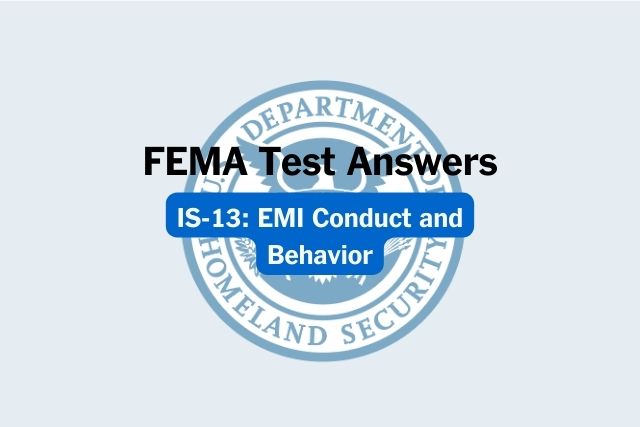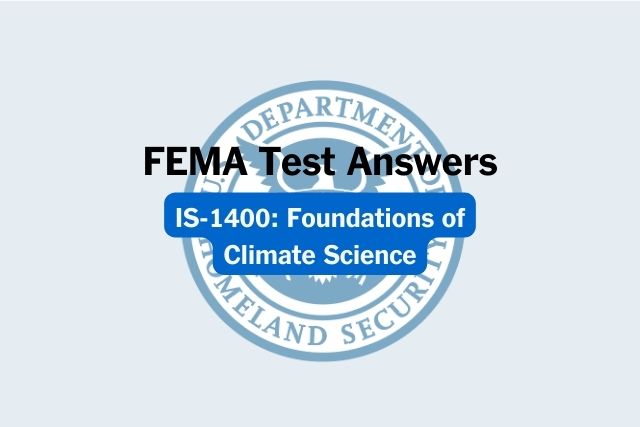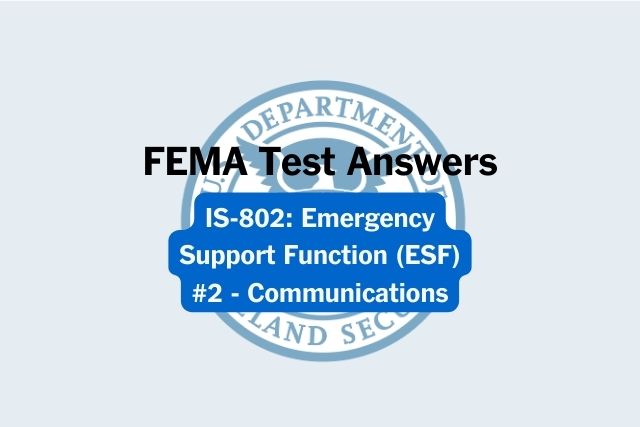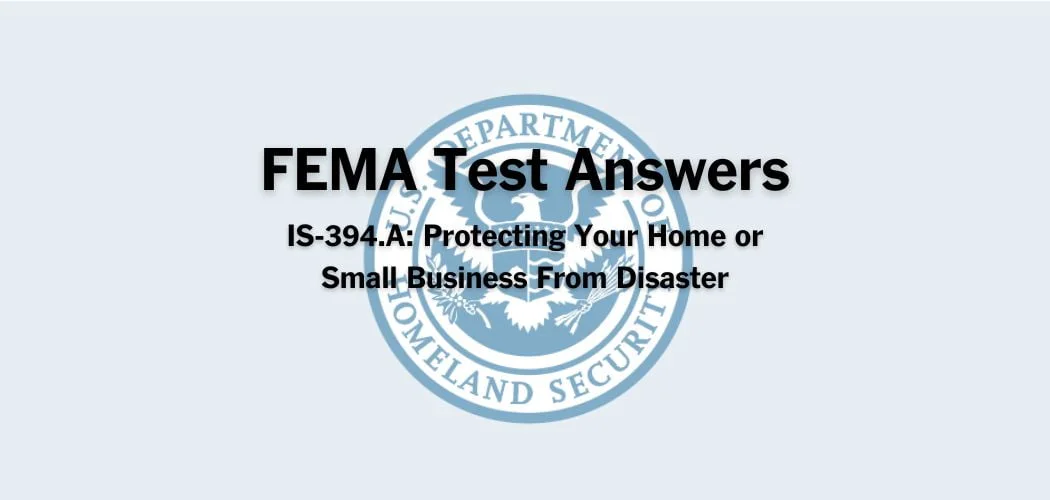Overview: The FEMA IS-1115 course was published on 10/1/2019 and is geared toward insurance agents and their role in the flood insurance claims process. The course focuses on preparedness, customer service, and things to know before, during, and after a client experiences a flooding disaster.
Primary audience: The IS-1115 course is for all insurance agents. It’s recommended to take first the IS-1101 Basic Agent Tutorial.
FEMA IS-1115 test answers
Each time this test is loaded, you will receive a unique set of questions and answers. The test questions are scrambled to protect the integrity of the exam.
Question 1. How many photos are necessary to support a flood insurance claim?
A. Two
B. Ten
C. Five
D. As many as possible✅
Question 2. To prepare for any natural disaster, what should your client create to ensure their family remains safe?
A. Contents inventory list
B. Flood Insurance Rate Map
C. A preparedness plan✅
D. Flood control project
Question 3. When you reach each of your clients, what should you advise your client to do first?
A. Report their flood loss✅
B. Call a remediation company before talking to their adjuster
C. Advise your client that you cannot help them with coverage questions
D. Call their local jurisdiction (City/County) for debris pick up
Question 4. If the insurance company finds an error in how the policy is rated after a claim is filed, which is a true statement?
A. The policy will be canceled
B. The claim will be denied
C. There are never errors found after a claim
D. It may result in a policy reformation to adjust the premium✅
Question 5. Building and Contents deductibles apply:
A. Separately for building and separately for contents✅
B. Only when you have your third claim
C. When federal disaster assistance is approved
D. As a single deductible for both building and contents
Question 6. What contents item is covered in a basement?
A. Refrigerator
B. Freezer
C. Television✅
D. Sofa
Question 7. To support a claim, what actions should your clients take?
A. Evacuate the insured property
B. Take photographs of the damaged property✅
C. Pay a third party to demolish the building immediately
D. Place all items on the curb for trash pickup before the adjuster arrives
Question 8. When applying for federal disaster assistance, which of the following statements is correct?
A. Federal disaster assistance is a local county initiative
B. Applicants cannot call FEMA to apply for disaster benefits
C. A local city mayor can make a presidential disaster declaration
D. NFIP flood policyholders are also eligible for federal disaster assistance✅
Question 9. When is federal disaster assistance available to U.S. applicants?
A. During a small event that flooded only 2 homes
B. After a Presidential Disaster Declaration✅
C. Before a hurricane or flooding causes damage in a community
D. After a flood in Mexico or Canada
Question 10. What is the purpose of advance payments?
A. To assist with additional living expenses
B. To begin repair or replacement of damages to the client’s home or business✅
C. To pay for the family’s next vacation
D. To purchase a new vehicle
Question 11. What is the most important piece of information a client can give to their adjuster?
A. The policy declarations page
B. Current telephone number and temporary address✅
C. Prior flood loss receipts
D. State driver’s license
Question 12. When the ICC mitigation effort is completed, what does the community provide to your client?
A. A housewarming gift
B. A Certificate of Occupancy✅
C. A Continuing Education certificate
D. A claim payment
Question 13. If your clients have content coverage, what should you have them complete to ensure their items are documented?
A. Contents inventory list✅
B. Policy Declarations page
C. Loss history report
D. Building itemized estimate
Question 14. When your clients receive an advanced payment, how does it affect their insurance claim payment?
A. Payment is an addition to the final claim payment
B. It is considered a grant provided by FEMA
C. Advanced payments do not have an impact on the claim payment
D. It will be deducted from their claim payment✅
Question 15. When the claim payment is issued, who may be listed on the payment check?
A. The lender✅
B. The insurance agent
C. The real estate agent
D. The adjuster
Question 16. When removing wet items from the property, why is it important to retain a small sample of each item?
A. As a keepsake for the memory book
B. To show the adjuster the quality of the item✅
C. It is not important to retain a sample
D. To prove that you owned the item
Question 17. During a flood, what is the first thing an agent should do before reaching out to your clients?
A. Stay safe to better serve your clients✅
B. Close the agency immediately
C. Move their family out of state
D. Go on vacation
Question 18. Why is it important to discuss whether the building description is accurate on the declarations page?
A. The flood premium is affected by a building’s square footage
B. The building description has a direct effect on how a policy is rated✅
C. The building description determines if a claim can be filed
D. The building description can affect whether a flood area gets presidentially declared
Question 19. What is the approximate cost of one inch of flooding?
A. $12000
B. $42000
C. $10000✅
D. $26000
Question 20. When are your clients able to return to their damaged property after a flood?
A. When their insurance adjuster tells them to
B. When they file their claim
C. When it is deemed safe by their local jurisdiction✅
D. When the water recedes
Question 21. Why is it important that the agent be an advocate for their client during the claims process?
A. The claims process is extremely easy, and the client rarely has questions regarding the claims steps.
B. The agent is required by FEMA to attend the annual adjuster claims presentation in order to sell flood insurance
C. The agent sold the flood policy and therefore knows more than an authorized FEMA adjuster
D. As an insurance expert, the agent can guide them through important questions and shine in the process✅
Question 22. ICC coverage payment can NEVER exceed:
A. The policy’s statutory limit✅
B. The amount of personal policy coverage purchased
C. The county appraisal value of the building
D. The premium paid for the policy
Question 23. Along with the claims adjuster, who else may visit your clients after a flood to grant permission to rebuild?
A. The IRS
B. Local permitting officials✅
C. A local TV reporter
D. The U.S. Fish and Wildlife website
Question 24. What publication should you discuss with your clients prior to a flood?
A. The Flood Insurance Manual
B. Elevation Certificate
C. Claims Proof of Loss form
D. Summary of Coverages booklet✅
Question 25. What step should be taken by your client immediately following reporting the flood loss?
A. Call their local jurisdiction to complain about lack of storm drainage
B. Begin cleanup of damaged items separating wet from dry✅
C. Ask the agent about purchasing contents coverage
D. Review their automobile policy coverage
Question 26. What is never covered under the Standard Flood Insurance Policy?
A. A/C units
B. Additional Living Expenses (ALE)✅
C. Appliances
D. Furniture
Question 27. If your client is moving their property out of harm’s way, where should they be moving it to?
A. In the SFHA
B. To their neighbor’s house
C. To the basement
D. Outside of the SFHA✅
Question 28. Flooding affects properties located in:
A. Special Flood Hazard Areas
B. Non-Special Flood Hazard Areas
C. Any areas, regardless of the flood zone✅
D. Areas susceptible to riverine flooding



